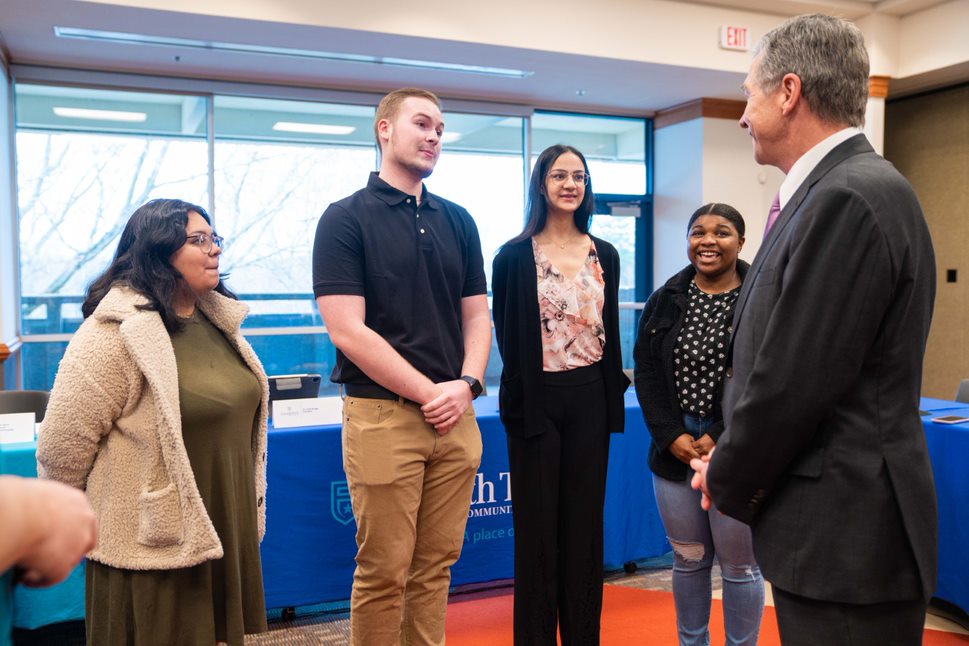![]() Creative Commons License" width="" />
Creative Commons License" width="" />
Republish our articles for free, online or in print, under a Creative Commons license.
Close window XEdNC is a nonprofit, online, daily, independent newspaper. All of EdNC’s content is open source and free to republish. Please use the following guidelines when republishing our content.
Please email Anna Pogarcic at [email protected] if you have any questions.
by Hannah Vinueza McClellan, EducationNC
August 15, 2022

Gov. Roy Cooper talks with Forsyth Tech students during a March visit spotlighting the Longleaf grant. Courtesy of Forsyth Tech
North Carolina high school students who graduated in 2022 can receive funding for tuition and fees at any of the state’s 58 community colleges through the $31.5 million Longleaf Commitment, which was extended to include 2022 graduates last November.
Gov. Roy Cooper launched the grant in May 2021 to supplement the federal Pell grant. The grant ensures recent high school graduates from low- and middle-income families receive anywhere from $700 to $2,800 per year to go toward tuition and fees for up to two years at N.C. community colleges. Nearly $8.7 million in Longleaf funds went to more than 13,600 students by last spring, the governor’s press office said. Of those students, 63% were from families with incomes less than $70,000 per year.
More than 25,000 students have now received Longleaf funds, according to the North Carolina Community College System (NCCCS). North Carolina students who graduated in 2022 can receive the Longleaf funds to use through fall 2024.
“North Carolina’s community college system, one of the largest in the country, is critical as the state seeks to provide the necessary workforce for its economic future,” said Dr. Kimberly Gold, chief of staff at the NCCCS. “The Longleaf Commitment Grant makes community college more affordable – increasing academic and career opportunities for students across the state.”
The grant was funded using the Governors Emergency Education Relief (GEER) fund through federal COVID-19 relief packages. The Longleaf Commitment is part of the state’s broader work to develop a strong workforce.
“The impact of the Longleaf Commitment Grant for 2020 and 2021 high school graduates has been staggering. In just the last two semesters, the Longleaf Commitment Grant has made higher education more accessible for over 25,000 high school students across our state – supporting stronger social mobility for more North Carolinians by helping them attain jobs with higher earning potential.”
Dr. Levy Brown, NCCCS senior vice president and chief academic officer
The grant is beneficial to students and colleges alike. When Forsyth Technical Community College offered free tuition to all N.C. high school graduates last year, for example, enrollment among recent high school graduates increased nearly 20% from before the pandemic.
“This was astonishing,” Devin Purgason, the director of college relations, marketing, and communication at Forsyth Tech, previously told EdNC. “We were really, really happy to be able to offer free college to all students that are 2021 graduates no matter their background. A lot of these students probably wouldn’t have come to college if they didn’t have this opportunity with this free tuition.”
Forsyth Tech used a combination of funding, including the Longleaf Commitment, to offer free tuition to all 2021 North Carolina high school graduates through its College Commitment grant program. In March, the college announced it will extend the College Commitment grant to all 2022 N.C. high school graduates.
Like other North Carolina colleges, Purgason said Forsyth Tech hopes to see funding like the Longleaf Commitment offered to students long-term. Community colleges already aim to connect students and adult learners with training and opportunities for higher-paying jobs. Offering free tuition helps community colleges in achieving that mission.
Renuka Khatri, a science student at Forsyth Tech, received the Longleaf grant last year. She said the funds greatly alleviated financial stress. Khatri plans to transfer to a university to work in health care — often an expensive field to pursue.
Khatri wasn’t initially considering community colleges in her college search. That changed when she saw a flyer about the Longleaf grant.
“I’ve been paying $0 to the college so far, so I’m very grateful for getting this opportunity,” she said. “A lot of students, when they go into the next semester, what they’re thinking about the most is how can we pay for it? How can my parents pay for it? The stress just lingers around your head, and it does impact your education. But these years I’ve been at Forsyth Tech have been so worry free. I did not have to once think about money.”